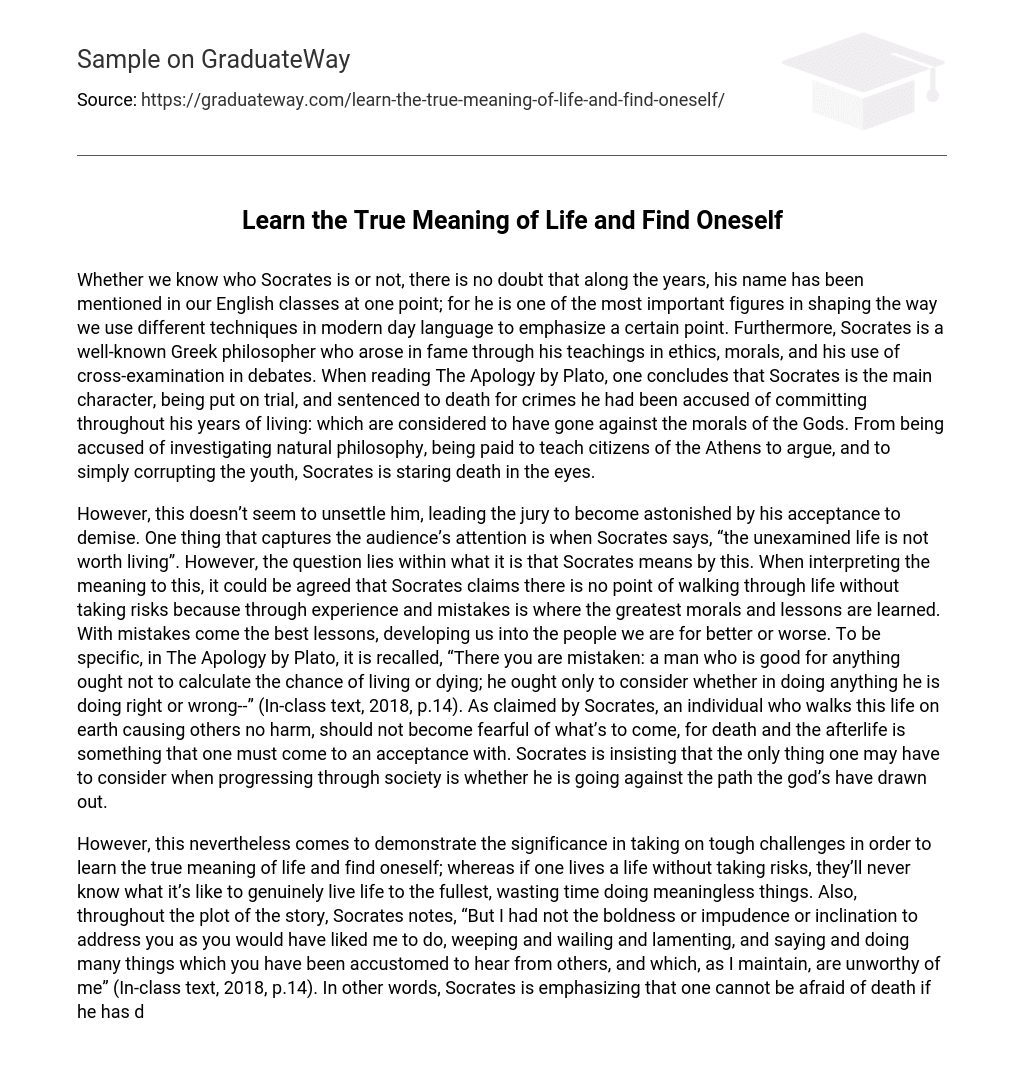Whether we know who Socrates is or not, there is no doubt that along the years, his name has been mentioned in our English classes at one point; for he is one of the most important figures in shaping the way we use different techniques in modern day language to emphasize a certain point. Furthermore, Socrates is a well-known Greek philosopher who arose in fame through his teachings in ethics, morals, and his use of cross-examination in debates. When reading The Apology by Plato, one concludes that Socrates is the main character, being put on trial, and sentenced to death for crimes he had been accused of committing throughout his years of living: which are considered to have gone against the morals of the Gods. From being accused of investigating natural philosophy, being paid to teach citizens of the Athens to argue, and to simply corrupting the youth, Socrates is staring death in the eyes.
However, this doesn’t seem to unsettle him, leading the jury to become astonished by his acceptance to demise. One thing that captures the audience’s attention is when Socrates says, “the unexamined life is not worth living”. However, the question lies within what it is that Socrates means by this. When interpreting the meaning to this, it could be agreed that Socrates claims there is no point of walking through life without taking risks because through experience and mistakes is where the greatest morals and lessons are learned. With mistakes come the best lessons, developing us into the people we are for better or worse. To be specific, in The Apology by Plato, it is recalled, “There you are mistaken: a man who is good for anything ought not to calculate the chance of living or dying; he ought only to consider whether in doing anything he is doing right or wrong–” (In-class text, 2018, p.14). As claimed by Socrates, an individual who walks this life on earth causing others no harm, should not become fearful of what’s to come, for death and the afterlife is something that one must come to an acceptance with. Socrates is insisting that the only thing one may have to consider when progressing through society is whether he is going against the path the god’s have drawn out.
However, this nevertheless comes to demonstrate the significance in taking on tough challenges in order to learn the true meaning of life and find oneself; whereas if one lives a life without taking risks, they’ll never know what it’s like to genuinely live life to the fullest, wasting time doing meaningless things. Also, throughout the plot of the story, Socrates notes, “But I had not the boldness or impudence or inclination to address you as you would have liked me to do, weeping and wailing and lamenting, and saying and doing many things which you have been accustomed to hear from others, and which, as I maintain, are unworthy of me” (In-class text, 2018, p.14). In other words, Socrates is emphasizing that one cannot be afraid of death if he has done everything in his power as a human being to experience things as he wishes, causing them to understand the meaning of life through both consequences and rewards.
Additionally, as a person who has sought out to find the true value of life, later devoting time to bring importance to his experiences; Socrates is a huge believer in finding one’s purpose on this earth. Moreover, in his perspective, one who doesn’t seek to find themselves in the world of sin will never truly understand the true reason of living. To add onto my previous statement, Socrates observes, “… nor do I repent of the style of my defense; I would rather die having spoken after my manner, than speak in your manner and live” (In-class text, 2018, p.14). As a person who has strong beliefs in life and has learned to view events from a different outlook, Socrates has mastered the art of examining life in ways that many during his time were not able to do (due to it being considered as challenging beliefs of the higher power).
When announcing that that he would rather die saying what he believes in rather than playing it safe, living up to the jury’s conditions, and staying alive, Socrates shows a prime example of what it truly means when he says, “the unexamined life is not worth living”. Finally, it may be concluded that within The Apology by Plato, there are a series of events in which lead back to the point Socrates makes when he claims that “the unexamined life is not worth living.” While the last few minutes of his life determine whether found guilty of innocent; Socrates attempts to keep a lasting impact for the citizens of Athens. In doing so, he is reminding the peoples that is important to live a life where they encounter certain events because it will be the reason for evolving into more knowledgeable and understanding individuals, promoting them to shift their morals and values along the way.





